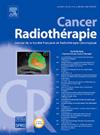Rectal cancer radiotherapy: 2025 update
IF 1.4
4区 医学
Q4 ONCOLOGY
引用次数: 0
Abstract
We present the updated recommendations of the Société française de radiothérapie oncologique (SFRO, the French society for oncological radiotherapy) for rectal cancer radiotherapy. The standard treatment for locally advanced rectal cancer consists in chemoradiotherapy followed by radical surgery with total mesorectal resection and adjuvant chemotherapy according to nodal status. Although this strategy efficiently reduced local recurrences rates below 5 % in expert centres, functional sequelae could not be avoided resulting in 20 to 30 % morbidity rates. The early introduction of neoadjuvant chemotherapy followed by chemoradiation has proven to be beneficial in recent trials, in terms of recurrence-free and metastasis-free survivals becoming the new standard treatment strategy. Complete pathological responses were obtained in 15 % of tumours treated by chemoradiotherapy, even reaching up to 30 % of tumours when neoadjuvant chemotherapy is associated to chemoradiotherapy. These good results question the relevance of systematic radical surgery in good responders. Personalized therapeutic strategies are now possible by improved imaging modalities with circumferential margin assessed by magnetic resonance imaging, by intensity-modulated radiotherapy and by refining surgical techniques, and contribute to morbidity reduction. Keeping the same objectives, ongoing trials are now evaluating therapeutic de-escalation strategies, in particular rectal preservation for good responders after neoadjuvant treatment or radiotherapy omission in selected cases.
直肠癌放疗:2025年更新
我们提出了法国肿瘤放疗学会(SFRO)关于直肠癌放疗的最新建议。局部晚期直肠癌的标准治疗方案为放化疗+根治性手术+全肠系膜切除术,并根据淋巴结情况进行辅助化疗。虽然这一策略有效地将专家中心的局部复发率降低到5%以下,但功能性后遗症无法避免,导致20%至30%的发病率。在最近的试验中,早期引入新辅助化疗后放化疗已被证明是有益的,就无复发和无转移生存而言,成为新的标准治疗策略。在接受放化疗的肿瘤中,15%的肿瘤获得了完全的病理反应,当新辅助化疗与放化疗相结合时,甚至高达30%的肿瘤获得了完全的病理反应。这些良好的结果质疑系统根治性手术在良好应答者中的相关性。个性化治疗策略现在可以通过改进成像方式,通过磁共振成像评估周缘,通过调强放疗和改进手术技术,并有助于降低发病率。为了保持相同的目标,目前正在进行的试验正在评估治疗性降级策略,特别是在新辅助治疗后良好反应的直肠保留或在选定的病例中省略放疗。
本文章由计算机程序翻译,如有差异,请以英文原文为准。
求助全文
约1分钟内获得全文
求助全文
来源期刊

Cancer Radiotherapie
医学-核医学
CiteScore
2.20
自引率
23.10%
发文量
129
审稿时长
63 days
期刊介绍:
Cancer/radiothérapie se veut d''abord et avant tout un organe francophone de publication des travaux de recherche en radiothérapie. La revue a pour objectif de diffuser les informations majeures sur les travaux de recherche en cancérologie et tout ce qui touche de près ou de loin au traitement du cancer par les radiations : technologie, radiophysique, radiobiologie et radiothérapie clinique.
 求助内容:
求助内容: 应助结果提醒方式:
应助结果提醒方式:


